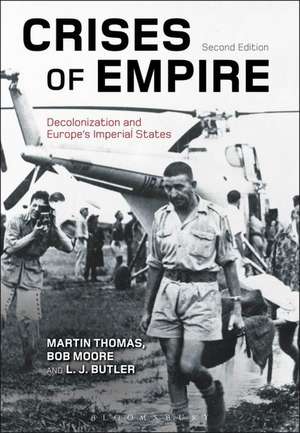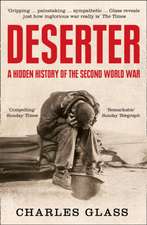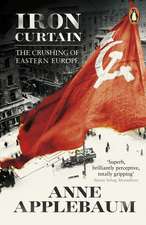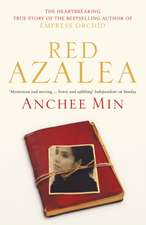Crises of Empire: Decolonization and Europe's Imperial States
Autor Martin Thomas, Professor Bob Moore, Larry Butleren Limba Engleză Paperback – 22 apr 2015
| Toate formatele și edițiile | Preț | Express |
|---|---|---|
| Paperback (1) | 246.48 lei 6-8 săpt. | |
| Bloomsbury Publishing – 22 apr 2015 | 246.48 lei 6-8 săpt. | |
| Hardback (1) | 781.31 lei 6-8 săpt. | |
| Bloomsbury Publishing – 22 apr 2015 | 781.31 lei 6-8 săpt. |
Preț: 246.48 lei
Preț vechi: 293.82 lei
-16% Nou
Puncte Express: 370
Preț estimativ în valută:
47.20€ • 48.17$ • 39.71£
47.20€ • 48.17$ • 39.71£
Carte tipărită la comandă
Livrare economică 25 februarie-11 martie
Preluare comenzi: 021 569.72.76
Specificații
ISBN-13: 9781472530257
ISBN-10: 147253025X
Pagini: 480
Dimensiuni: 169 x 244 x 28 mm
Greutate: 0.79 kg
Ediția:2 Rev ed.
Editura: Bloomsbury Publishing
Colecția Bloomsbury Academic
Locul publicării:London, United Kingdom
ISBN-10: 147253025X
Pagini: 480
Dimensiuni: 169 x 244 x 28 mm
Greutate: 0.79 kg
Ediția:2 Rev ed.
Editura: Bloomsbury Publishing
Colecția Bloomsbury Academic
Locul publicării:London, United Kingdom
Caracteristici
Revised to include more on the Belgian and Portuguese empires and cultural aspects of decolonization
Notă biografică
Martin Thomas is Professor of Imperial History at the University of Exeter, UK.L. J. Butler is Emeritus Reader in History at the University of East Anglia, UK. Bob Moore is Professor of 20th Century European History at the University of Sheffield, UK.
Cuprins
PrefaceIntroduction: Constructions of decolonization Part I: British DecolonizationIntroduction to Part I1. The British Empire, 1918-1945: Interwar Change and Wartime Pressures2. The First Wave of British Decolonization: Commonwealth Territories, South Asia and the Gold Coast, 1945-19513. British Decolonization, Insurgency and Strategic Reverse: The Middle East, Africa and Malaya, 1951-19574. Winds of Change: The Final Waves of British Decolonization in Africa and Asia after 1957Part II: French DecolonizationIntroduction to Part II5. The Roots of French Decolonization: Ideas, Economics and Reform, 1900-19466. Decolonizing the French African Federations after 19457. People's War and the Collapse of French Indochina, 1945-19548. From French North Africa to Maghreb Independence: Decolonization in Morocco, Tunisia and Algeria, 1945-19569. Algeria's Violent Struggle for Independence10. Territories Apart: Madagascar, the Togo Trusteeship and French Island TerritoriesPart III: Dutch DecolonizationIntroduction to Part III 11. An 'Ethical Imperialism'? The Dutch Colonial Empire Before 194512. Indonesia: The Politics of Delusion, 1940-194713. Indonesia: The Realities of Diplomacy14. Unfinished Business: New Guinea as a Last Outpost of Empire15. Decolonization by Default: Dutch Disengagement in SurinamePart IV: Contrasting Patterns of Decolonization16. Contrasting Patterns of Decolonization: Belgian and Portuguese AfricaConclusion: Changing Attitudes to the End of EmpireGlossaryBibliographyIndex
Recenzii
[This] book, now available in a revised and slightly extended second edition, is the remarkable result of collaboration among three eminent historians with different areas of expertise in twentieth-century Europe and its empires ... [and] one of the best overall surveys of decolonization in the British, French, and Dutch imperial spheres. ... Crises of Empire remains an authoritative account and a must-read for all those who teach and conduct research on this crucial process of the twentieth century.
In this book, Thomas, Butler and Moore admirably accomplish the goal of combining intellectual and historiographical rigour with the breadth of discussion necessary for a textbook. As one of the few treatments of its kind, it connects the disintegration of various empires. Juxtaposing the fates of the British, French and Dutch empires, supplemented with some comparative observations about the Belgian and Portuguese experiences, the authors show that decolonization cannot be fully understood if treated within the isolation of any one of these cases. The careful balance in this volume between conceptual discussion of current historiographical debates and thorough empirical treatment of the various decolonizations makes this volume an invaluable resource for students and researchers alike.
An outstanding collection of essays dealing with the decolonization of the Dutch, Belgian, and Portuguese empires as well as those of the French and British. With a range from the 1940s to the 1970s and beyond, the authors guide the reader through complex conceptual issues in a way that is consistently clear and compelling. This is a book that will be mandatory reading for students and scholars of the dissolution of the European colonial empires.
This second edition of Thomas's, Moore's and Butler's incisive, thought-provoking and generally deeply impressive synthesis is very welcome. Like the first edition, it is written in an engaging style by three experts in their respective decolonisation fields and it will prove a key launch pad for further research into the expansive literature and ever-evolving debates on the causes and consequences of European decolonisation. The sections relating to the different empires and case-studies of particular territories can be read alone. But the beauty of this book lies in its high level of comparative analysis, with commonalities and contrasts skilfully brought out in the masterful introduction and conclusion. The focus remains on the three largest empires of Britain, France and The Netherlands but the excellent section on the Portuguese and Belgian end-of-empire experiences has been significantly expanded. Throughout, the text has been updated to take account of new historiographical developments since the first edition's publication in 2008. It pulls no punches in its exploration of the often fraught and violent ending of the European empires, and the ongoing legacies and unresolved contestations of the decolonisation moment.
In this book, Thomas, Butler and Moore admirably accomplish the goal of combining intellectual and historiographical rigour with the breadth of discussion necessary for a textbook. As one of the few treatments of its kind, it connects the disintegration of various empires. Juxtaposing the fates of the British, French and Dutch empires, supplemented with some comparative observations about the Belgian and Portuguese experiences, the authors show that decolonization cannot be fully understood if treated within the isolation of any one of these cases. The careful balance in this volume between conceptual discussion of current historiographical debates and thorough empirical treatment of the various decolonizations makes this volume an invaluable resource for students and researchers alike.
An outstanding collection of essays dealing with the decolonization of the Dutch, Belgian, and Portuguese empires as well as those of the French and British. With a range from the 1940s to the 1970s and beyond, the authors guide the reader through complex conceptual issues in a way that is consistently clear and compelling. This is a book that will be mandatory reading for students and scholars of the dissolution of the European colonial empires.
This second edition of Thomas's, Moore's and Butler's incisive, thought-provoking and generally deeply impressive synthesis is very welcome. Like the first edition, it is written in an engaging style by three experts in their respective decolonisation fields and it will prove a key launch pad for further research into the expansive literature and ever-evolving debates on the causes and consequences of European decolonisation. The sections relating to the different empires and case-studies of particular territories can be read alone. But the beauty of this book lies in its high level of comparative analysis, with commonalities and contrasts skilfully brought out in the masterful introduction and conclusion. The focus remains on the three largest empires of Britain, France and The Netherlands but the excellent section on the Portuguese and Belgian end-of-empire experiences has been significantly expanded. Throughout, the text has been updated to take account of new historiographical developments since the first edition's publication in 2008. It pulls no punches in its exploration of the often fraught and violent ending of the European empires, and the ongoing legacies and unresolved contestations of the decolonisation moment.




















